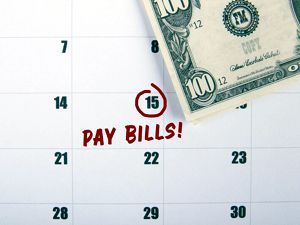Paying Your Bills
This is a Flashback Post from 2009.
I found three of these old draft posts that were half-written from over a decade ago. Most of the information is just as relevant today as when I first wrote it, so I decided to finish writing them, with some modern perspective.
- 2010 – How to Negotiate a Raise
- 2010 – Living with Debt
- 2009 – Paying Your Bills
Stay On Top

(2009) Tough times have made it hard for many people to make ends meet. Between the high gas prices, inflation and the stagnation of real wages, it’s getting harder than ever for American families to pay their bills. And, if you are late or miss a couple of payments, it gets even harder. By the time the interest and penalties are added in, it may seem like a world of debt is caving in on you. Unfortunately, there are only a few creative ways to pay out more than you bring in each month and none of them are going to work for the long-term. The best plan is to stay on top of your finances and to not get behind. Being human and having limited income, this may not always be possible. But, every dollar spent on late fees is a dollar you won’t have for other purposes. So, make a genuine effort to pay your bills on time and it will be much easier for you to manage.
Confront your Creditors
(2009) One positive aspect of these tough times is that banks and creditors are very willing to talk to people about making payments. And, they have a surprisingly cooperative attitude. Especially, if you call them first and offer to pay something. I believe most creditors realize that people are on the edge with debt and the old “hard line” just isn’t going to work. People are tapped out. Take the initiative and call your creditors. Tell them what you can afford to pay and then pay it on time, every month. Don’t be concerned with their demands. If they tell you that your payment terms are unacceptable, tell them you will send it to your other creditors. Offer to pay at least the minimum payment, as long as they agree to freeze any over-limit fees and penalties. Stop the bleeding.
Have a Plan
(2009) One of the most comforting things to have in a crisis is a plan. Unfortunately, the last thing most people want to do is to think about their debt, so they avoid facing it. But this is exactly what you must do in order to overcome the negative feelings. You should create a plan which establishes your dominance over the debt. A plan also shows you how far the light is at the end of the tunnel. The debt snowball has been around for quite a while and it works. Basically, you list out all of your debts and pay them off systematically. Entering your debts into the snowball also gives you a realistic time-frame of when you could be out of debt.
Leverage Technology
(2022) The most useful tools I have found in the battle of the budget are Online Banking and Bill Pay. People who have trouble paying their bills usually don’t budget or even know where their income is going. Changing this around can be as easy as using the free tools that come with your checking account. Avoiding overdrafts and late fees is critical when you are struggling financially. Don’t give your precious money to banks and creditors. Turn the tables on them, using their own technology. Setup low-balance alerts and pay attention to your finances.
Side-Hustle Money
(2022) Looking back at the hard times I’ve had in my life, hustling up some side-money has always been my savior. It started as a survival mechanism to put food in the fridge when my paycheck was gone and turned into an income stream that helped me save up a down-payment on my house. I cannot overstate how incredibly helpful even a modest amount of extra money can be for your budget. This is your get-ahead money, because it comes above and beyond the bills in your normal budget. Nobody wants to work overtime, pickup extra shifts or work a side-gig on their days off, but this is exactly what you may need to pull ahead.
The Bottom Line
Paying bills in the most efficient and least expensive way is one key to a prosperous life. The struggle is real for those who dodge or avoid their bills. You don’t need that kind of stress in your life or drain on your finances.
“Worrying about bills, food or other problems leaves less capacity to think ahead or to exert self-discipline. So, poverty imposes a mental tax.” – Nicholas Kristof
2 thoughts on “Paying Your Bills”